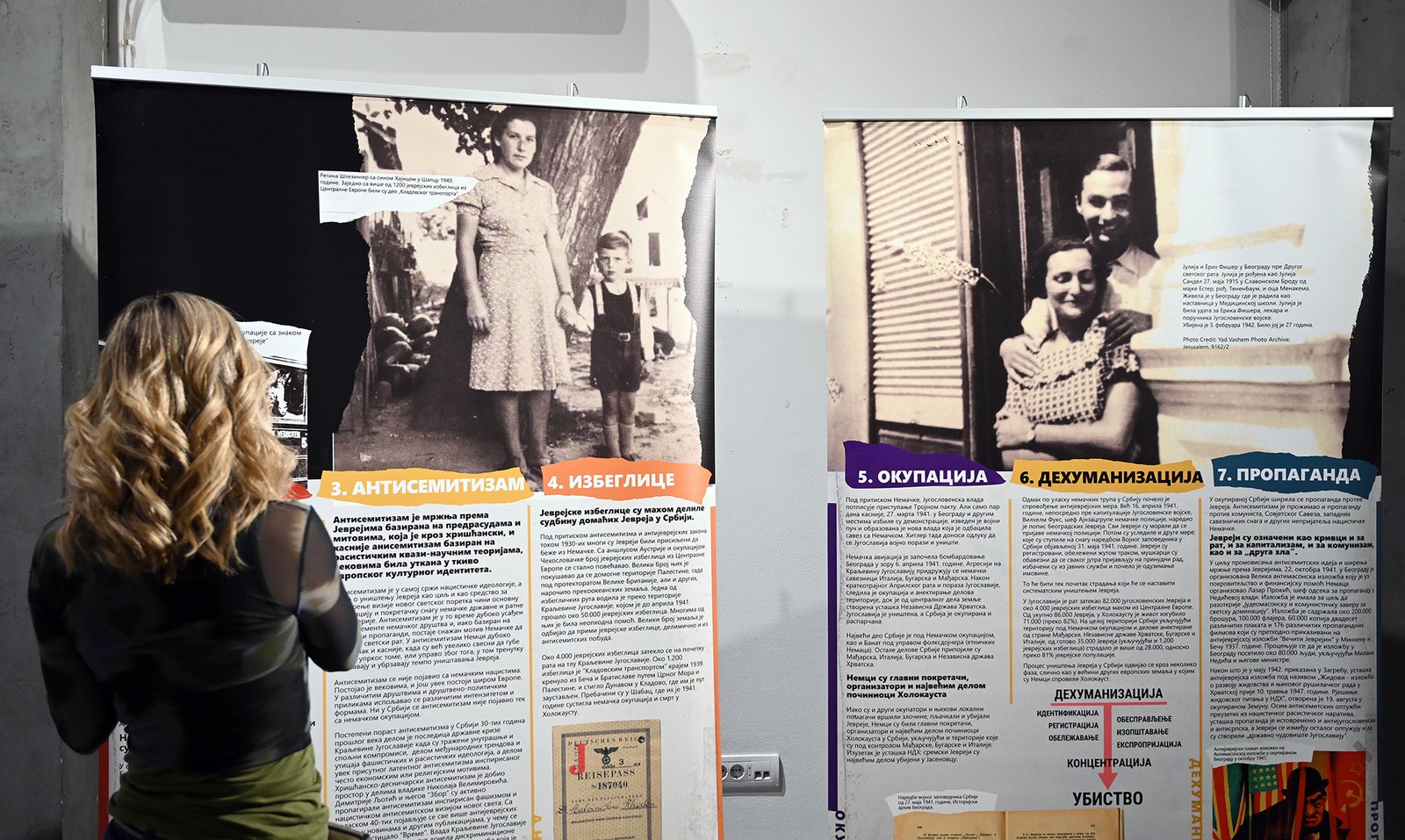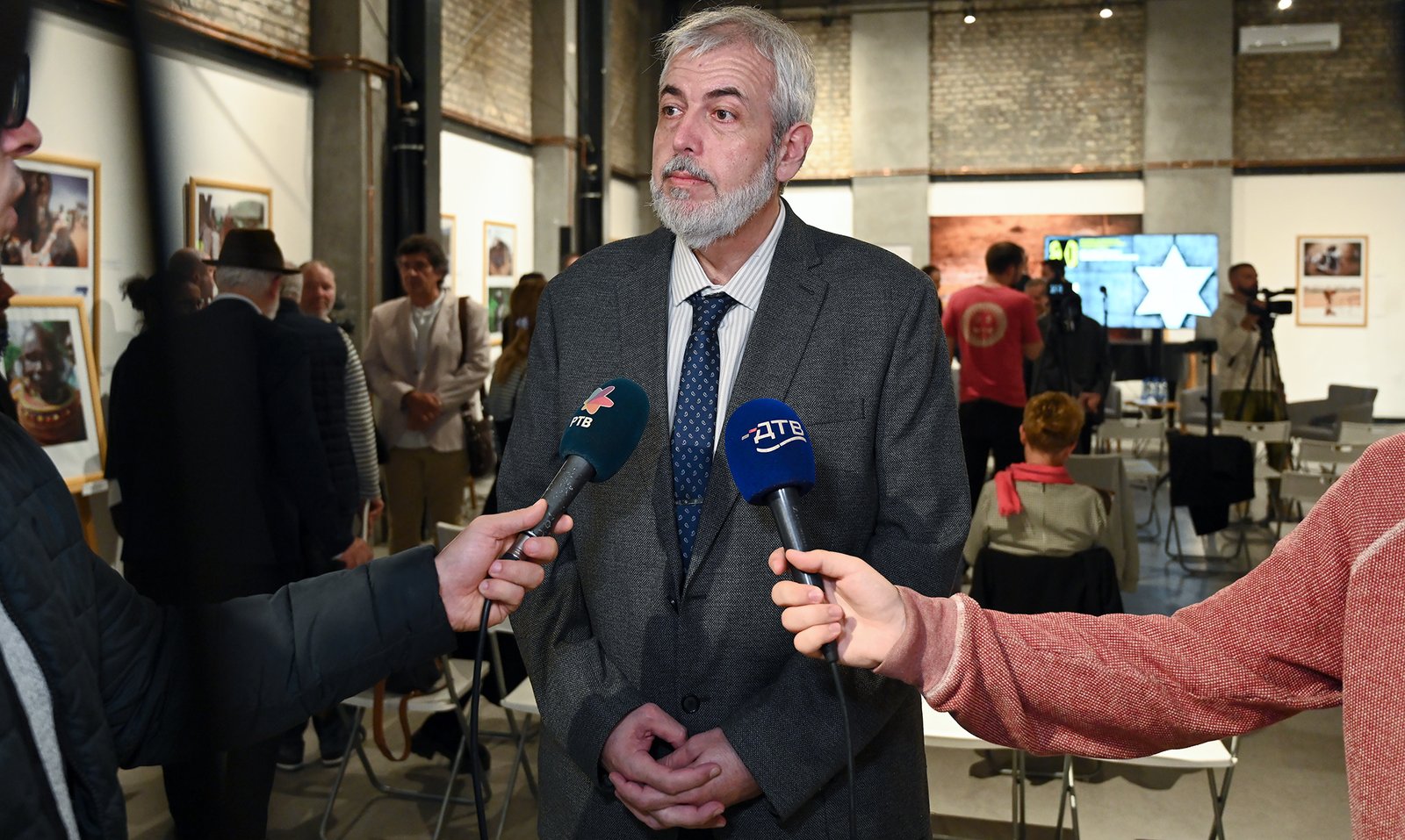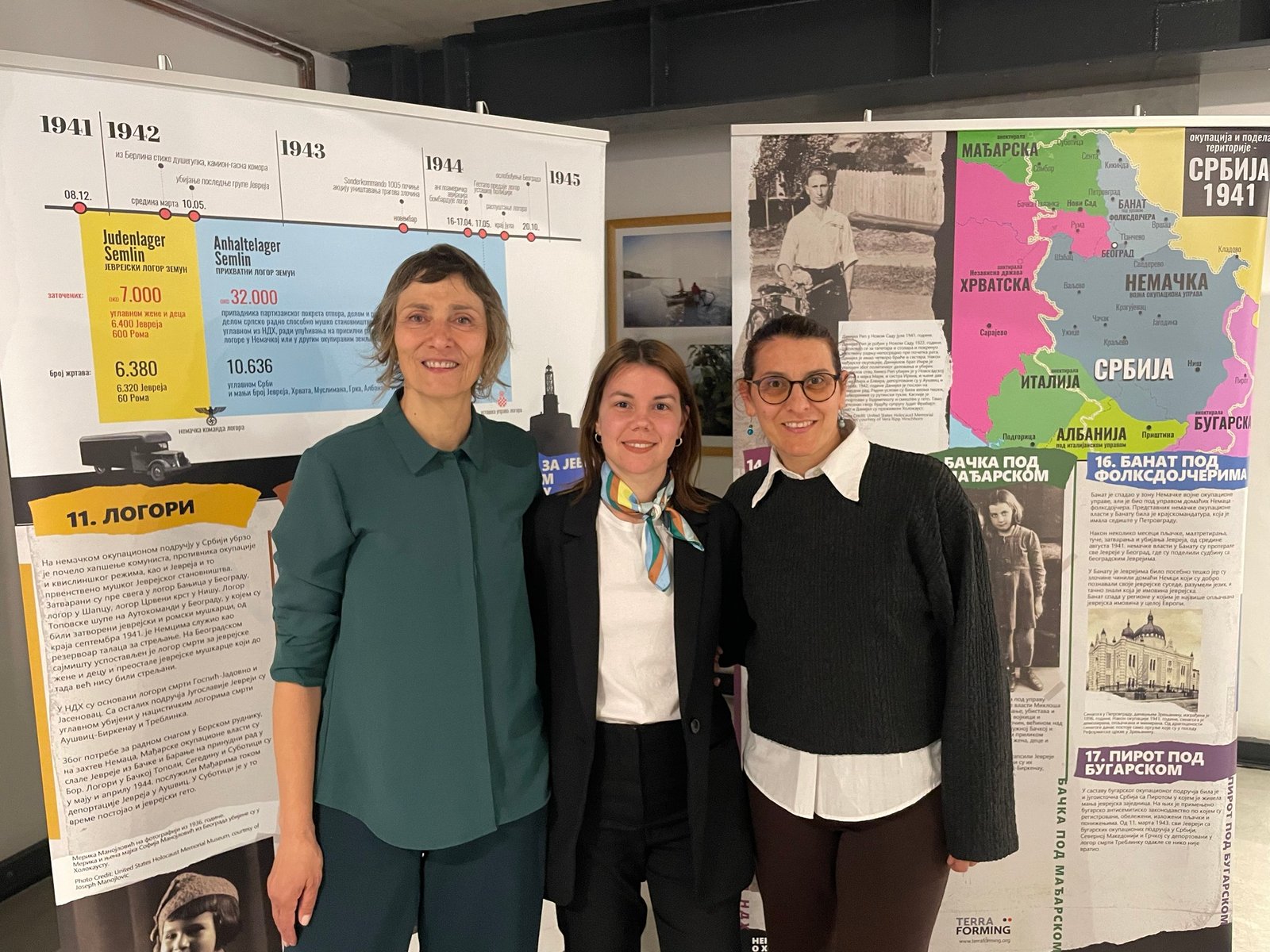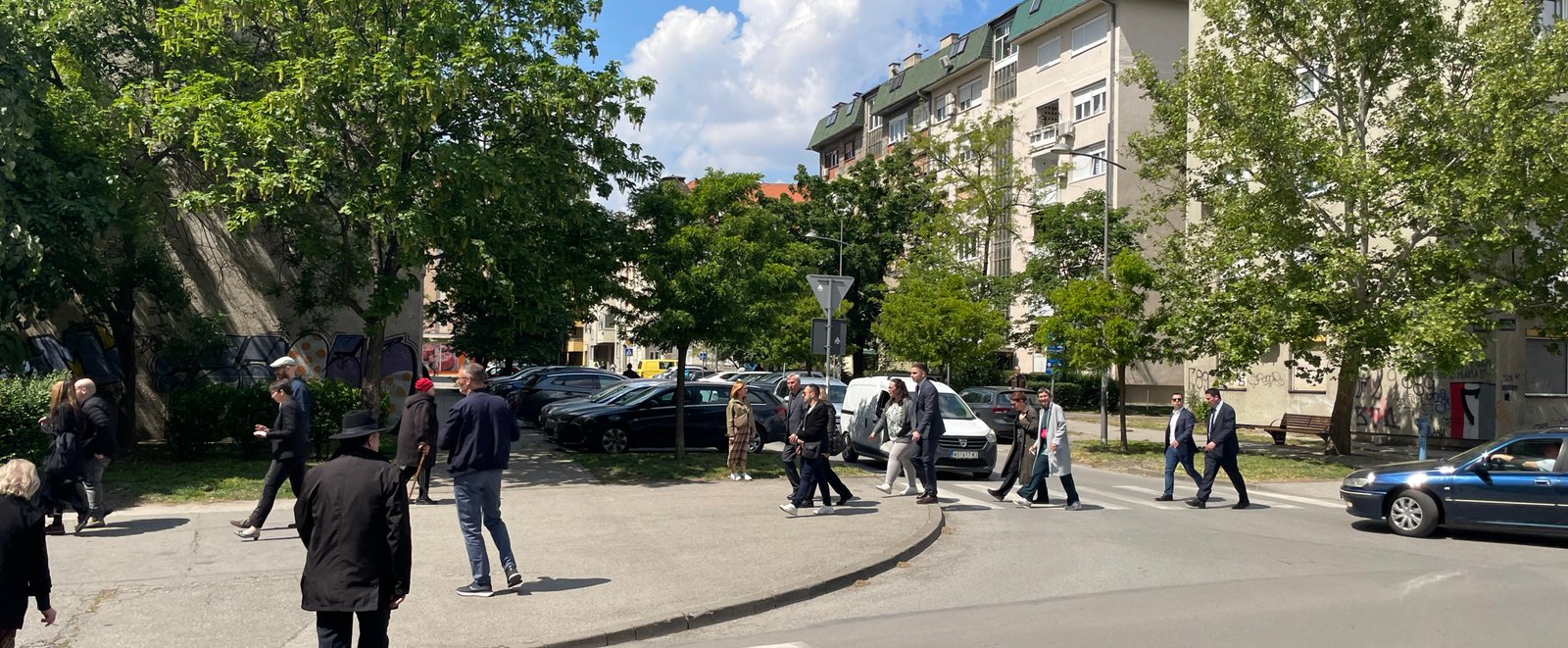Distinguished guests, dear friends,
thank you for being with us tonight when we commemorate the 80th anniversary of one of the most terrible crimes that befell our city – the deportation of the Jews from Novi Sad and Bačka to the Nazi death camps in 1944.
First, I would like to thank the Jewish Community of Novi Sad for its excellent cooperation and support in organizing this commemoration, which will take place over two days: today in the Silk Factory and tomorrow at the Synagogue. I invite you all to meet at noon tomorrow in front of the Synagogue. Special thanks to Mr. Mirko Štark and Mr. Ladislav Trajer.
I would also like to thank the representatives of the City Administration and the leadership of the Delegation of the Republic of Serbia in the International Holocaust Remembrance Alliance for their support and participation in the program. Thanks also to the Silk Factory team. Many thanks to the ambassadors and representatives of the embassies of Israel, Germany, and Great Britain.
An unprecedented crime
The Holocaust was the systematic and state-sponsored persecution and killing of Jews by Nazi Germany and its collaborators in the period from 1933 to 1945.
The Holocaust is an unprecedented crime in history. Nazi Germany based its ideology on racist antisemitism. Before the dream of the new world order and living space for the German nation, for the Third Reich, the destruction of Jews became not only an instrument but the goal and sole purpose. Because when Germany is already essentially losing the war, the killing of Jews accelerates and intensifies despite or precisely because of it.
The Holocaust is an unprecedented crime in the history of humanity for a series of characteristics, which you can read about in the introductory part of the publication “Some words about the Holocaust in Serbia,” which I hope you all received today.
The Holocaust in Novi Sad
The Holocaust in Novi Sad, just like on the entire European continent, took place in parallel with other forms of violence against different groups of victims. In Bačka, those other groups of victims were primarily opponents of the occupying regime, regardless of their national or religious affiliation, and they were Serbs whose presence in these areas the Hungarian fascist forces tried to reduce.
During the Holocaust, the population of several thousand Novi Sad Jews was almost completely destroyed. In the Novi Sad raid in 1942, Hungarian fascists killed over 900 Jews. During the entire period of the Hungarian occupation of Bačka, Jews were deprived of rights, mistreated, robbed, expelled, forced into forced labor, and killed.
After German troops occupied Hungary in March 1944, one of the most terrible and monstrous operations of the Holocaust began already in April, when in just eight weeks, about 424,000 Jews from Hungary were deported to Nazi death camps. As part of this logistically highly complicated and demanding operation, over 565,000 Jews were transported and killed from Hungary and territories under Hungarian occupation.
German and Hungarian forces began mass arrests of Jews in Novi Sad, as well as in the entire territory of Bačka, in the morning hours of April 26, 1944. All members of the Jewish community were arrested, including children, women, the elderly, and the sick. Practically, the entire Jewish population of Novi Sad was taken to the Novi Sad Synagogue.
They were closed in the Synagogue from April 26 to 28 without water, food, and toilets. From there, they were taken by transport to concentration camps in Subotica, Baja, and Bačka Topola, where they were distributed and deported by trains to Nazi death camps, most of them to Auschwitz. Most were killed in gas chambers immediately upon arrival in the camp. Of about 1,900 Novi Sad Jews who were deported in April 1944, only about two hundred survived.
Rebuilding the life of the Jewish community
After the liberation, only a few hundred Jews returned to Novi Sad. Some survived the war as fighters in the partisans, in exile and hiding, or despite everything, they survived the horrors of camps across Europe. A large number of survivors moved a few years later, primarily to Israel but also to other countries.
It was challenging to rebuild the life of the Jewish community of Novi Sad. Those who survived and decided to stay in Novi Sad, who found the strength to create a new life, found families and built a new community, formed the backbone from which grew the new young stem of the Novi Sad Jewish community we have today.
We thank them for that. We thank them for preserving, for all of us, the trace of Jewish life that was and remains a part of the identity of our city and, therefore, a part of our shared identity, what makes us citizens of Novi Sad.
With each year, the commemoration of the deportation of Novi Sad and Bačka Jews becomes a stronger tradition. However, we must work harder to ensure that all citizens of Novi Sad understand the scope and significance of this event, which forever changed the face of our city because deportation meant not only the almost complete destruction of the local Jewish community but also a vast irreparable loss for our entire society.
During the Holocaust, 70%, i.e. 3,020 of the total 4,350 Jews who lived in Novi Sad before the war, were killed. Just like on the entire European continent, so in Novi Sad, the Holocaust changed our society forever. That is why the memory of this event is not only part of our concern about the memory of the past but is part of a much larger common European culture of memory.
Contemporary antisemitism and Holocaust distortion
Ours, as well as the European culture of memory, is facing two immense challenges today. One is the unprecedented increase in antisemitism, which we will discuss more in today’s panel with distinguished guests from Great Britain, Germany, Croatia, and, of course, our representatives from Novi Sad. But before I invite the panel participants, I want to draw attention to another big problem: the misuse of history for nationalist and populist propaganda.
In recent days, we see that the focus of this propaganda is shifting towards the distortion of what constitutes genocide and the manipulative interpretation of facts in order to increase the feeling of frustration and injustice towards the victims as a means to inflame fear and hate. Opposing this trend, we point out that the Republic of Serbia accepted and adopted the definitions and recommendations of the International Holocaust Remembrance Alliance, thereby accepting international standards in Holocaust memorialization and education.
Now more than ever, as we face the rise of antisemitism, the abuse and distortion of history to promote nationalism, hatred, and an anti-democratic agenda, it is essential that we advocate for a brave and meaningful culture of remembrance. Hijacking the culture of memory for political propaganda distorts not only the understanding of what constitutes genocide but, more importantly, why we remember such historical experiences, that is, what desired goals and outcomes of memorialization and education we want to achieve. The desired goals of a brave and meaningful culture of remembrance are crystal clear: we remember the victims with respect as individuals, and we strengthen critical thinking, pluralism, and civil and human rights.
By organizing this event, we wanted to contribute to strengthening this kind of memory culture. So thank you for being with us tonight. And a special thank you to our guests, whom I now invite to take the stage…









